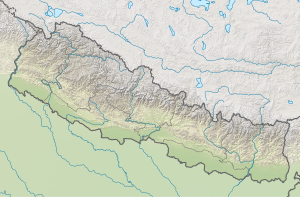Ichchhakamana Rural Municipality
Ichchhakamana
इच्छाकामना गाउँपालिका | |
|---|---|
| Coordinates: 27°49′N 84°34′E / 27.82°N 84.57°E | |
| Country | |
| Province | Bagmati Province |
| District | Chitwan |
| Wards | 7 |
| Established | 10 March 2017 |
| Government | |
| • Type | Rural Council |
| • Chairperson | Mr. Dan Bahadur Gurung (दानबहादुर गुरुङ)(CPN-UML) |
| • Vice-chairperson | Mrs. Maya Silwal (माया सिलवाल)(CPN-UML) |
| Area | |
• Total | 166.67 km2 (64.35 sq mi) |
| Population (2011) | |
• Total | 25,012 |
| • Density | 150/km2 (390/sq mi) |
| Time zone | UTC+5:45 (Nepal Standard Time) |
| Headquarter | Kurintar |
| Website | ichchhakamanamun |
Ichchhakamna (Nepali: इच्छाकामना) is an only rural council located in Chitwan District in Bagmati Province of Nepal.
Total area of the rural municipality is 166.67 square kilometres (64.35 sq mi) and total population is 25012 individuals.[1][2][3]
The rural municipality was formed on 10 March 2017, when Government of Nepal announced 753 local level units as per the new constitution of Nepal 2015.[4] thus the rural municipality came into existence. The rural council was formed merging following former VDCs: Darechok, Chandi Bhanjyang, Kaule and Dahakhani. The rural council is divided into 7 wards and the admin center of the rural council is located at Chandi Bhanjyang
Demographics
[edit]At the time of the 2011 Nepal census, Ichchhakamna Rural Municipality had a population of 25,067. Of these, 58.5% spoke Nepali, 21.8% Chepang, 7.4% Magar, 7.1% Gurung, 1.9% Tamang, 0.9% Bhojpuri, 0.8% Newar, 0.3% Hindi, 0.3% Maithili, 0.3% Thakali, 0.3% Urdu, 0.2% Bhujel, 0.1% Rai, 0.1% Tharu,[5]
In terms of ethnicity/caste, 33.4% were Chepang/Praja, 26.8% Gurung, 12.0% Magar, 4.8% Hill Brahmnin, 4.5% Chhetri, 3.9% Tamang, 3.2% Kami, 3.1% Newar, 3.0% Gharti/Bhujel, 1.3% Damai/Dholi, 0.8% Sanyasi/Dasnami, 0.6% Musalman, 0.5% Teli, 0.4% Thakali, 0.3% Rai, 0.2% Kalwar, 0.2% Kathabaniyan, 0.2% Tharu, 0.1% Kumal, 0.1% Majhi, 0.1% other Terai, 0.1% Thakuri, 0.1% Yadav and 0.4% others.[6]
In terms of religion, 61.3% were Hindu, 26.5% Buddhist, 7.9% Christian, 3.6% Prakriti, 0.6% Muslim and 0.1% others.[7]
Ward Profile
[edit]Presidents of Wards[8]
References
[edit]- ^ "District Corrected Last for RAJAPATRA" (PDF). www.mofald.gov.np. Retrieved 17 July 2018.
- ^ "स्थानीय तहहरुको विवरण" [Details of the local level bodies]. www.mofald.gov.np/en (in Nepali). Ministry of Federal Affairs and Local Development. Retrieved 17 July 2018.
- ^ "Official website of Ichchhakamna rural municipality". www.ichchhakamanamun.gov.np. Retrieved 7 September 2020.
- ^ "New local level structure comes into effect from today". www.thehimalayantimes.com. The Himalayan Times. 10 March 2017. Retrieved 17 July 2018.
- ^ NepalMap Language [1]
- ^ NepalMap Caste [2]
- ^ NepalMap Religion [3]
- ^ "Ichchhyakamana Rural Municipality - Election 2079 | Results and Updates | Local Election of Nepal 2079 - Chitwan, Bagmati Pradesh | Ekantipur Election".



